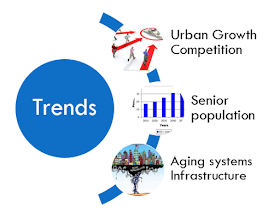This is part-1 of my blog about Smart City - powered by Microsoft Dynamics 365 and describes the need for making our cities smarter. (for the purpose of this blog a citizen is anyone who lives, visits or needs services in the city)
Why Smart City?
Population growth - I grew up in Mumbai (Bombay, India) and saw first hand the rapid growth in population, transportation, pollution and social-economic development challenges faced by a city for providing sustainable living for its citizens. As the global urbanization movement continues it is projected that 68% of the world population (1) will be in living in urban areas by 2050 - an estimated increase by 2.5 billion or @80+ million people will be moving to cities and urban areas every year worldwide. The city senior population is also increasing and this requires more attention to provide elder care and support services. Increasing population puts a strain on the City resources and the implicit demand for citizen services cannot be met with the existing governance and maintenance services model.
 |
| Need to make cities smarter |
Competition - As cities look for tax revenue gains they are competing with other cities to attract large corporations (think Amazon HQ2) to set-up HQ offices and thus improve the quality of life for the current and future citizens. A city which does not have plans to modernize its systems and services may not be attractive to the corporate firms to invest their money.
Aging infrastructure and systems - Most of the cities have old infrastructure. The transportation trains, roads, bridges and tunnels needs to be upgraded. They were not planned to manage the current growth and will fail to sustain the future growing demands. Many of the city systems are also old and in need of upgrade or replacement.
 |
| City challenges |
Citizen expectations - Lets now think from the citizens point of view. The citizen today is more educated, knowledgeable and aware of their rights. They expect the same or better services from the City government which they are used to get from the commercial or private sector. They also want more engagement and involvement in the city government activities. They are demanding for transparency and accountability in the entire process of how their tax dollars are being utilized. The citizens wants to live in a well protected and safe environment. A self aware citizenry is expecting the city government to provide a better future for its citizens.
 |
| Higher expectations |
City governments currently operate a silo'ed business model. They are made up of multiple agency's and departments. Each may have its own systems of records and they do not share their information by default design. The city governments have to comply to various federal and state laws such as - HIPAA, CJIS, PCI, GDPR, IRS and many others. Additionally city governments have to provide services to its citizens who speak multiple languages and may be visiting the city. This demand provides opportunities as well as challenges and needs to be managed.
With increasing population, growing demands and aging infrastructure & systems it is imperative for City governments to look for long term sustainable solution. Smart City can provide the optimal solution for city governments to provide a better quality of life for its citizens.
In my next blog I will write about how Microsoft Dynamics 365 with Azure IOT can power a Smart City solution. Please let me know what challenges are faced by your city and the solutions that are planned or implemented.
Mihir Shah
@mihircrm
365WithoutCode
ref - (1) UN Dept. of economic and social affairs - https://www.un.org/development/desa/en/news/population/2018-revision-of-world-urbanization-prospects.html
